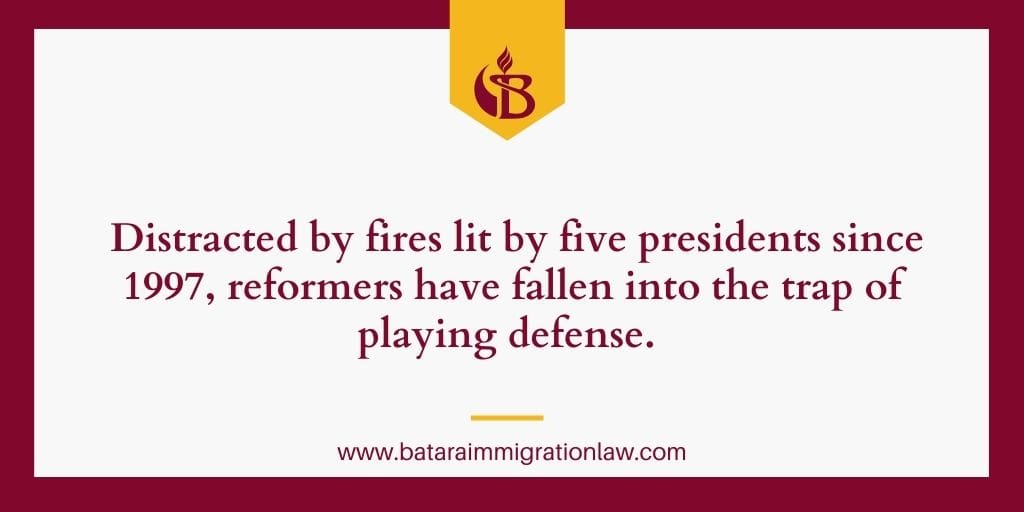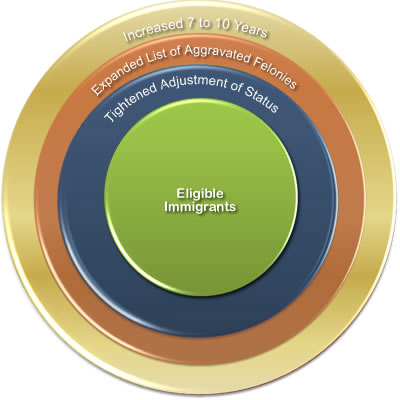
April 1, 1997.
The day IIRAIRA went into effect.
The day we entered the Age of Immigration Darkness.
Those of us involved in immigration battles at that time had an inkling what the future held.
We knew immigration law was entering unchartered territory. We knew we were in for a long term fight.
We knew Immigration Fools Day was not a one-day prank.
But few, if any, of my fellow warriors suspected that 27 years later, minimum rollback would have taken place.
Immigration Fools’ Day: The Age Of Immigration Darkness Begins
The changes which went into effect that day continue to plague immigrant families today.
They reflected the onset of the Congressional War against immigrant due process, a war which persists largely unabated today.
Few, if any, of my fellow warriors would have predicted that a quarter of a century later, the drastic measures enacted – like implementation of 3-year, 10-year, and permanent bars to admissibility, and imposition of the exceptional and extremely unusual hardship standard for court cases – would still be in place harming immigrant families day in, and day out.
The changes which went into effect that day are summarized in the podcast below.
Lingering Effects Of IIRAIRA: 27 Years Of Unabated Immigration Harm
To say the least, I am dismayed – though not surprised – by the lingering effects caused by the enactment of the Illegal Immigration Reform and Immigrant Responsibility Act.
Far more than this blog post can communicate.
Rather than share a long list of legal grievances, I’ll focus on two political responses, which irritate me day in and day out.
Responses that undermine our ability to win substantive immigration change.
First, I’m disappointed in the flight from comprehensive and compassionate immigration reform.
After all, consider what’s at stake.
Nothing less than the destruction of countless families. A process that continues unabated today.
Distracted by fires lit by four presidents since 1997, reformers have fallen into the trap of playing defense.

Even a win does not guarantee a victory. Legal triumphs evolve into massive political brawls.
Round after round, immigrants remain unprotected against the rules of legal warfare written over two and a half decades ago.
We need to return to the core fight.
Whatever the Biden Administration puts or does not put into place.
The time for political waffling has long passed.
Second, I am disillusioned by the sparse attention paid to our broken immigration court system.
It is not like the flaws are unknown.
News articles from the Los Angeles Times, the Houston Chronicle, the Huffington Post, and numerous other publications have made the issues clear over the past 20 years.
Yet, cries for extensive repair have shrunk into a groan for an independent court system – away from the control of the Attorney General.
The leaders of that push?
Immigration judges.
Not exactly allies of immigrants and their families.
An independent court without a change in the rules underlying relief from deportation is not the answer.
What’s required is to undo and redo the rules which set this due process wreckage in place.
Merely hiring more judges does not address the core issue.

Prelude To Immigration Farce
A joke based on cruelty is farce, not humor.
The issue is amplified every year on the first day of April. Whereas most April Fools’ jokes are not based on deep-seated ill will, the travesty imposed on immigrants on that day can be characterized in no other fashion.
This year, April 1, 2024, marks the 27th anniversary since several bolts fell off the hinges of family unity and deportation defense.
However, the attempt to address these problems suffers from a sense of political urgency from many of those in Congress, on the right and the left.
Have they failed to understand the ill-spirited mischief levied against immigrant families that day?
I doubt it. They simply choose to ignore the evil imposed that day.
With each passing year, the Illegal Immigration Reform and Immigrant Responsibility Act appears more like a political artifact, earmarking the end of due process for immigrants.
On the surface.
There is an alternate reality.
We have the ability to rewrite the history of immigration law.
And we must.
IIRAIRA set in motion nightmares that have been continuously experienced by immigrants during the Clinton, Bush, Obama, Trump, and Biden administrations.
They began the next day.
Biden was in the Senate at that time. Certainly, he remembers the changes signed into law by President Clinton.
How far he will go to rectify such issues is unknown. We should not wait to find out. We need to play an active role in shaping the future.
The Day After IIRAIRA Became The
Law Of The Land
On April 2, 1997, a local businesswoman visited my San Diego immigration law office. She brought her two brothers. She was a citizen. They were undocumented immigrants.
They were both “A” students in high school. She feared they would never be able to attend college in the United States.
About six months beforehand, she learned immigration laws were about to change.
Some friends had informed her that new laws were going to restrict opportunities for individuals lacking legal papers to live and work in the U.S. legally.
She was also told the seven-year amnesty rule would be eliminated.
There was no such rule.
Blind to reality, she went to an immigration office to inquire about the changes.
There she learned the seven-year suspension of deportation rule was ending. A new ten-year rule would take its place.
She was also informed that one of the requirements, hardship, was changing.
Under the current rule, the hardship to be suffered by the immigrant, himself or herself, who faced being deported, was weighed by the government. But under the soon-to-be new rule, the hardship to those like her brothers would no longer count in their favor.
Before leaving, she was encouraged to fill out an application for her brothers to be interviewed.
She was encouraged, in other words, to become a victim of the new Immigration Fools’ Days rules.
For several months, she was not called. She was not sent a notice for an appointment.
The appointment request form had been specially prepared for applicants like her, requesting an interview to surrender before the law changed.
She did not comprehend the nature of her actions.
In essence, she had offered to voluntarily bring in her brothers to be interviewed to start deportation proceedings against them.
In late March, she finally received a notice to appear for an interview on April 4, 1997, three days after the law changed.
She decided to seek legal counsel to explain what happens at the interview.
She was clueless about the larger issues.
Like many immigrants nationwide, she was unaware the Age of Immigration Darkness had commenced.
I advised her to tread cautiously.
I explained how the law had changed – and more importantly, I explained what the interview possibly meant for her siblings.
BEFORE IIRAIRA: IMMIGRANT ELIGIBILITY

In short, due to all the restrictions imposed on pathways to permanent residence, the pool of immigrants who would qualify for relief had been greatly narrowed.
AFTER IIRAIRA: IMMIGRANT ELIGIBILITY

To Trust Or Not Trust Government Agencies: That Is The Immigration Question
Before she proceeded, I suggested figuring out how the government planned to handle such interviews, since the new law had already went into effect a few days earlier.
She was shocked and furious.
I understood her sentiment. It’s happened more often than I care to recall.
It’s a natural reaction to unexpected bad immigration news.
A Hazardous Legal Position: Deciphering The Intent Of Immigration Agencies
I knew the source of her emotions.
She wanted badly to obtain legal documents for her brothers. She believed filling out the request for an interview was a step in the right direction.
She failed to grasp an immigration truism.
When it comes to immigration reform, proposed cures are often worse than the problem.
We went back-and-forth for almost 90 minutes. Finally, I convinced her to allow me to probe the government regarding its intentions. We agreed on a plan.
I would inquire whether those who had filled out these special forms months ago, but had not been interviewed before April 1, 1997, would be placed in proceedings under the old rules or the new rules.
Once I had an answer, she could decide what actions to take.

For nearly eight weeks, government counsel for DHS and I exchanged several telephone and written communications.
Despite insistent efforts to uncover the real agenda, the government would not admit its intentions.
I suspected applicants, like the two high school brothers, would be put into court proceedings under cancellation of removal.
When we met again, I explained to the businesswoman that if my hunch was correct, her brothers could be automatically deported. They would not meet the new statutory provisions. They had lived in the U.S. eight years. The old law required seven years. The new law required ten years.
In the end, due to the uncertainties, she decided not to re-request an interview.
That’s not the end of the story.
A Peak Behind The Government Curtain
Some people question, “Carlos, why are you so distrustful of immigration agencies?”
Here’s one example.
About a week after the businesswoman’s decision, my request for a face-to-face discussion with district officials to address the interview notices was granted.
Upon arrival, I was escorted to a conference area.
Along the way, I passed a room, with a door slightly ajar, where I saw about 3,000 to 5,000 files sitting on huge tables.
I asked the escorting agent about them.
He responded, “Interview requests”.
“Unprocessed?”
“Yes. We just began reviewing them a few weeks ago.”
“Why so long?”
“Policy.”
It was a rare peak behind the government curtain.
At that point, I no longer needed a meeting.
I now knew the answers to my concerns.
By Carlos Batara, Immigration Law, Policy, And Politics




